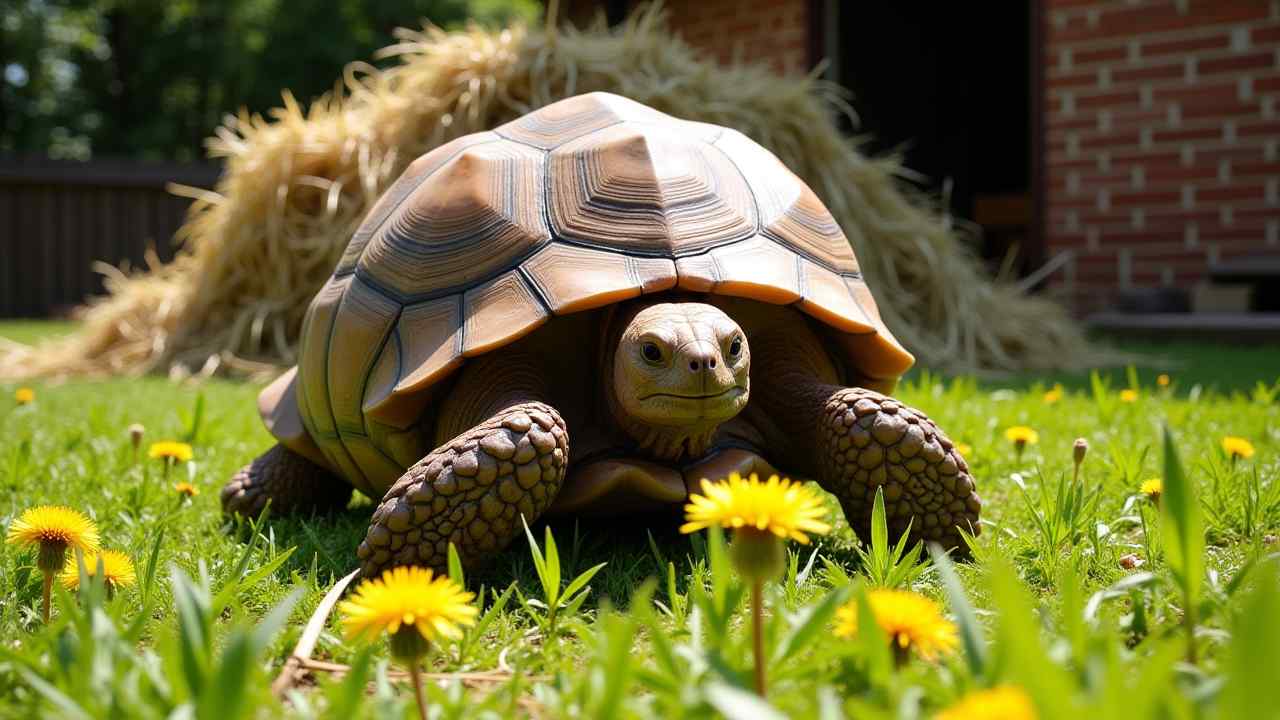
🐢 The African Spurred Tortoise Diet (A Complete Sulcata Food Guide)
🐢 A Guide to the African Spurred Tortoise Diet (What to Feed Your Sulcata) 🐢
The African Spurred Tortoise, or Sulcata, is a magnificent animal. It is one of the largest tortoise species in the world. Owning a Sulcata is a lifelong commitment. Their health and longevity depend entirely on proper care.
The most critical aspect of their care is their diet. These tortoises are strict herbivores. They have very specific nutritional needs. An incorrect diet is the most common cause of health problems in captivity. This guide will provide a complete overview.
We will cover the essential foods for a healthy African spurred tortoise diet. We will also list the dangerous foods you must avoid. Let's ensure your giant friend lives a long, healthy life. ✅
🌾 What is the Foundation of a Healthy Sulcata Diet?
The foundation of a proper African spurred tortoise diet is simple. It should consist mainly of grasses and hays. This mimics their natural diet. In the wild, they graze on the semi-arid grasslands of Africa. This is the most important part of their food.
What Are the Best Grasses and Hays?
Your tortoise should have access to grasses and hay at all times. This should make up about 80-90% of their total food intake. The best choices are:
- Orchard grass hay
- Timothy hay
- Bermuda grass hay
If you have a pesticide-free lawn, they can graze on grasses like Bermuda or fescue. This high-fiber diet is essential for their digestive health. It also helps to keep their beak naturally trimmed.
🌿 What Else Can You Feed an African Spurred Tortoise?
In addition to grasses, you should offer a small daily "salad." This should be made up of safe broadleaf weeds and greens. This part of the African spurred tortoise diet provides a variety of vitamins and minerals.
What Are the Best Weeds and Greens?
Weeds that are safe for tortoises are incredibly nutritious. Excellent choices include dandelion greens and flowers, clover, and plantain weed. Hibiscus and mulberry leaves are also great options. Growing a safe garden for your tortoise is ideal.
What About Store-Bought Greens?
When weeds are not available, some store-bought greens can be used. These should be offered in moderation. Good choices include spring mix, escarole, and endive. Prickly pear cactus pads (Opuntia) are another fantastic and natural food source.
🚫 What Foods Must an African Spurred Tortoise NEVER Eat?
This is the most critical section for your pet's safety. Many common foods are extremely dangerous for a Sulcata. Feeding these items can cause irreversible damage. Avoid these foods completely.
Should You Feed Them Fruit?
No, never feed your tortoise fruit. Their digestive system is not designed to handle sugar. Fruit will cause severe diarrhea and painful gas. It can also lead to a dangerous imbalance in their gut flora. This can be fatal.
Can They Eat Animal Protein?
Absolutely not. Never give your tortoise dog food, cat food, or any meat. Animal protein is toxic to their kidneys. It causes rapid, unhealthy shell growth. This condition is known as pyramiding. It leads to kidney failure and a painful death.
What About Grains and Dairy?
A tortoise cannot digest these foods. Bread, pasta, cheese, and yogurt are all strictly off-limits. Their digestive system is not built for these complex human foods.
☀️ What About Supplements and Water?
Proper supplementation is a key part of a healthy African spurred tortoise diet. This is especially true for growing tortoises. They need specific nutrients for their massive shells and bones.
You should lightly dust their daily salad with a calcium powder. Use a plain calcium carbonate supplement without added D3. Do this 3 to 5 times per week. You should also always provide a large, shallow water dish. They need to be able to soak and drink easily.
Most importantly, your tortoise needs UVB light. If housed indoors, a high-quality UVB bulb is not optional. This light allows them to produce vitamin D3. Without D3, they cannot use the calcium in their diet. This leads to a serious condition called Metabolic Bone Disease (MBD).